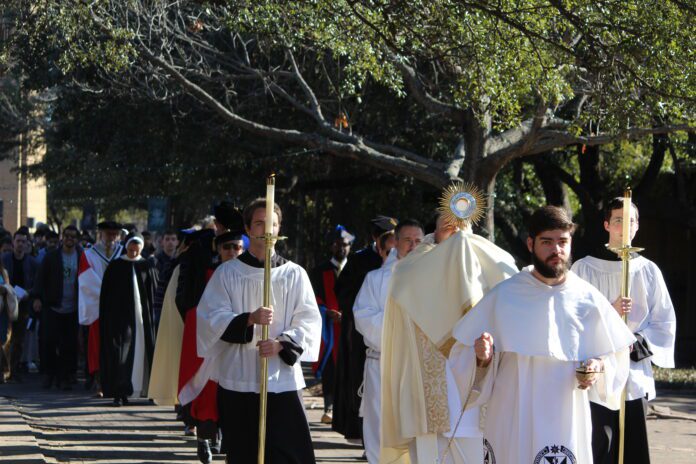Disclaimer:
All articles published within this section of The Cor Chronicle are the opinions of the respective authors and do not necessarily reflect the opinions of The Cor Chronicle.
On Jan. 28, 2024, in celebration of the Feast of Saint Thomas Aquinas and in preparation for the Aquinas lecture the following day, the philosophy department sponsored a Eucharistic procession on campus. Making its way from the church, the procession turned towards the tower, crossed the length of the mall, and, once it arrived again at the church, concluded with Benediction and the veneration of St. Thomas’ relic.
It was fitting that a Eucharistic procession should mark the feast of St. Thomas, and it was particularly fitting that this event—which is the first of an intended annual tradition—should begin this year, a year specially dedicated to the nationwide Eucharistic revival.
Indeed, Thomas Aquinas loved the Eucharist. Though students of philosophy or theology may spend much time parsing the careful distinctions made by Aquinas in the “Summa Theologica,” the contemplative heart of the saint is perhaps most fully on display in his beautiful Eucharistic hymns, poems that open and close daily Eucharistic adoration.
Aquinas will always be a patron of this school simply because he is the patron of Catholic schools and students everywhere. This is understandable: his intellectual output is astounding, and he coupled it with extraordinary humility and innocence. His Eucharistic devotion, however, also ought to impress itself more and more deeply upon those who seek to be united more intimately with Christ; indeed, it ought to set an example, especially for us students, who have such ready access to prayer before the tabernacle.
Aquinas was fully conscious of the gift that the Eucharist is. His hymns bespeak a steady, peaceful attention to the Eucharist, but they are nonetheless passionate.
In “O Salutaris Hostia,” Aquinas observes that “bella premunt hostilia”—hostile battles press upon us—but he implores the Eucharist to give strength and carry help. Attending to his words, I urge that we recognize that Christ in the Eucharist is beside us in every difficulty we find ourselves in.
After all, our studies in literature and history tell us so. In Evelyn Waugh’s “Out of Depth,” the Eucharist draws together past and present. In Graham Greene’s “Hint of an Explanation,” it is that which the altar boy cannot betray, the seed of a priestly call.
In Robert Hugh Benson’s “Lord of the World” and Myles Connolly’s “Mr. Blue,” the Eucharist remains when all the rest of civilization has fallen; it is the presence that endures until the end of the world.
The Eucharist has always been there throughout history too. It touched the lips of the apostles the day before the crucifixion. It constituted one of the fundamental marks of the early church. It was brought to the east by Cyril and Methodius and to the west by Patrick. Tarcisius was beaten to death, Miguel Pro was shot and Bl. Janos Brenner was stabbed 32 times because they loved Christ in it. It was hidden in priest holes by English Jesuits and consecrated on the hoods of army Jeeps by a Kansas priest in Korea.
Never has the Eucharist forsaken the world; it has never been out of touch. Christ is always there—yesterday, today, forever—waiting to be loved.
Sometimes it is easier to love something when it is put at risk. I recall when a ciborium was accidentally dropped at a daily Mass at UD some time back. The hosts scattered on the floor, but, without a word, the people silently knelt and adored as the priest meticulously recovered each host and purified the ground. Christ might have fallen, but he was still there, making his presence known more intensely than ever before.
We live in an age when the Eucharist, in the hearts of many people, is thrown to the ground and put at risk. As oft-repeated statistics show, relatively few Catholics believe in the real presence at all. Can it be that Hobbes and Hume—and all who, through ignorance, dismiss the Eucharist—will win out in the end? I do not think so.
Let Thomas Aquinas be our example. He displayed how rich the Eucharistic mystery is. He showed, moreover, that attention to the Eucharist need not be strongest only when belief in it is most at risk. By displaying a deep devotion to the Eucharist through his study and his poetry, he laid out the way in which we too, in our privileged years as students, can grow deeper in the faith and more loving of our Eucharistic Lord, and thus prepare to bring the truth of this sweet sacrament to the whole world.
Let us follow Thomas’s saintly model, then, and think more often and more deeply about our God in the Eucharist; let us follow after God in devotion; let us fly to his presence in every need.
